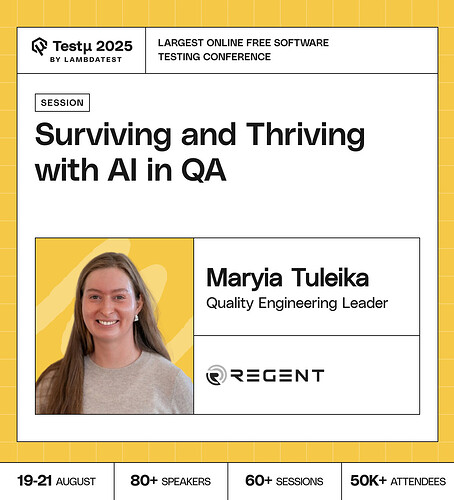Join Maryia Tuleika as she unpacks the realities of AI in QA, where it helps, where it falls short, and why skilled QA professionals remain irreplaceable.
Discover how to balance AI adoption with critical thinking, creativity, and core QA expertise to safeguard long-term career growth.
Learn practical strategies to leverage AI as a complement, not a replacement, ensuring it simplifies your work while preserving the true value of QA.
 Don’t miss out, book your free spot now
Don’t miss out, book your free spot now
What practical steps can QA professionals take to adapt and stay relevant in an AI-driven testing world?
How can experienced QA leads effectively mentor their teams to use AI as a productivity tool rather than a crutch that hinders their professional growth?
How do we balance AI-driven automation with the critical human skills that ensure software quality?
With AI handling more of the repetitive work, is knowledge of traditional frameworks still a core skill, or has the center of gravity moved toward AI-based testing practices?
In the age of AI-powered testing tools, does it still make sense for QA engineers to invest time in learning established frameworks like Selenium and Rest Assured? Or should the priority shift toward AI-driven testing strategies?
What’s the biggest challenge QA professionals face in adapting to AI-infused workflows?
With rapid evolving changes with AI, how to survive and enhance knowledge with QA innovations?
What is the single most important piece of advice you would give a junior QA engineer who is starting their career in this AI-driven world?
Are the risks of over-reliance on AI in QA illustrated with concrete examples?
How important is it for tester to get to know about AI integrations creating testing workflows?
At what scale can we expect the shift from traditional software testing to move into the AI testing space?
Are we at risk of creating “lazy testers” who overtrust AI-driven test automation?
How can QA professionals leverage AI’s advanced capabilities (like predictive analytics and pattern recognition) to proactively identify and prevent defects even before testing begins?
How will QA professionals ensure ethical AI practices, particularly regarding bias mitigation, data privacy, and transparency in test results and decisions?
What are the challenges in implementing AI in quality?
What skills should testers develop to stay relevant and thrive as AI adoption increases?
Should AI-generated test cases be treated as drafts for humans to refine or as ready-to-run assets?
Could AI-driven QA become a continuous quality assistant embedded in CI/CD pipelines?
What would make AI in QA feel indispensable to your team?
![]() Don’t miss out, book your free spot now
Don’t miss out, book your free spot now